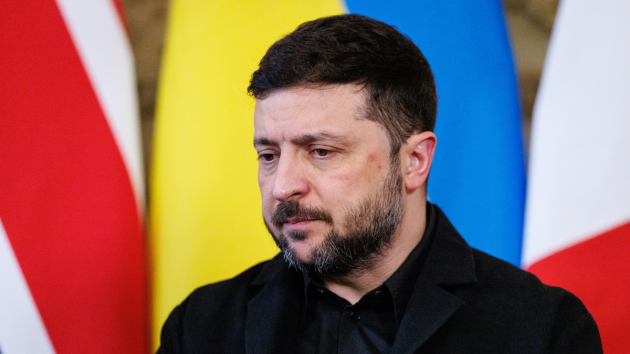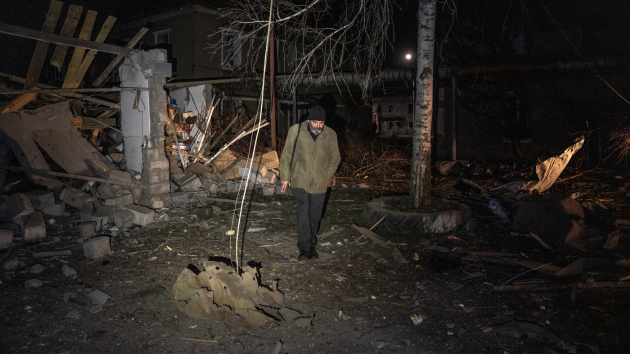Oxfam’s Scott Paul describes the deaths of aid workers as a ‘failure’ everyone shares
Written by ABC AUDIO ALL RIGHTS RESERVED on April 5, 2024

(NEW YORK) — Scott Paul, the associate director for peace and security at Oxfam America, spoke with ABC News Live about the crisis in Gaza and the necessary steps to protect civilians and aid workers.
Paul believes that the tragic deaths of seven employees of World Central Kitchen this week are a collective failure on everyone’s part, despite the fact that over 200 aid workers have been killed in the past six months after not being able to muster enough support to prevent such incidents from happening.
He stated that Gaza is the most dangerous place for aid workers and that it’s the deadliest conflict we have seen in quite some time, all because it appears to be a free fire zone, where there are no restrictions on the use of military force.
Paul sat down with ABC News Live to suggest a complete ceasefire in Gaza, along with malnutrition relief and medical interventions.
ABC NEWS LIVE: Joining us now for more is associate director for peace and security at Oxfam, Scott Paul. Scott, thanks for taking the time. Let’s dive right into this. Today, you called the killing of the World Central Kitchen workers systematic. What have you seen that’s led you to that?
SCOTT PAUL: What’s happened this week is tragic, but it is not anomalous. I think it’s a collective failure on all of our part that the outrage we have mustered for the seven people working for World Central Kitchen who are killed this week, we haven’t managed to muster for the more than 200 aid workers who were killed over the past six months.
I say it’s systematic because it’s part of an ongoing pattern. We know what the problems are. We know what the solutions are, and nothing is changing. And if we expect anything to change without a marked shift in policy on the part of the Israeli authorities, we should be prepared to be disappointed.
ABC NEWS LIVE: Well, let’s dig into that a little bit. The UN spokesperson says that they see a blatant disregard for international humanitarian law in Gaza. Do you think this amounts to war crimes?
PAUL: We’ve seen war crimes on the part of the Israeli authorities and, of course, on the part of Hamas going back to October the 7th. But yes, this is a particular kind of attack that we’ve seen, carried out on, if not daily, then certainly weekly basis. This is why now Gaza is the most deadly place for aid workers, not just now, but it’s the most deadly conflict that we have recorded for quite some time.
And the reason is because it appears to be a free-fire zone. There are processes that aid workers typically set up with militaries to make sure that the militaries know where aid workers are, to make sure they know that they’ll be safe. Those processes have failed. But let’s also remember that those processes are meant to be a last resort, a failsafe. The first resort is that militaries need to understand where the military targets are and only fire on those military targets.
ABC NEWS LIVE: Yeah. And when we get statistics like this that children are surviving trying to eat grass, 245 calories a day, now, in light of this, this latest attack, less aid will get in. You know, I hear what you’re saying, and I hear what everybody, you know, the world doesn’t want this to happen. But now what has to happen right now in Gaza for all of this to stop?
PAUL: There needs to be a ceasefire. Full stop. There is no alternative to a ceasefire. And the reason is because aid workers cannot safely provide for the basic needs of 2.2 million people in Gaza. While this level of hostilities continues. I should add, by the way, it’s not just humanitarian assistance that needs to flood the zone. It’s commercial activity, it’s basic services that have been cut off since October 8th because humanitarian assistance is never by itself going to meet the needs of 2.2 million people.
But, as a starting point, there needs to be. And this isn’t just an expression of our values and hope that people are safe, because we do hope the people are safe, but it’s simply not going to be possible to scale up, to manage what is likely already a famine in the north, and prevent what is likely to even, will be a larger famine in the middle and southern parts of Gaza. That we’re on track for at the moment.
ABC NEWS LIVE: And Chef [Jose] Andres has said that he was in contact with the IDF, and all of their movements were being relayed to the IDF. In lieu of a ceasefire, which, you know, people are trying to get their heads around right now. What actually has to happen to protect the aid workers who are still bringing that crucial humanitarian assistance to the people there in Gaza?
PAUL: Well, there is no in lieu of a ceasefire. I’ll accept the premise just for a moment to say, there is more that can be done to protect aid workers. For a start, the basic rules of engagement that the Israeli military is following has to change.
There can’t be an assumption that when you don’t, when you don’t know why someone is moving around, that they’re targetable or they’re considered military. It can’t just be left up to the process by which we transmit our coordinates to protect people, because even if we do that, it still means that the vast majority of Palestinians who are civilians, who are not combatants, who are not fighting against Israel, will still be vulnerable.
You need to flood the zone not just with food, but with malnutrition interventions, medical interventions. And that is not possible so long as this level of violence is present and so long as this level of obstruction is present.
ABC NEWS LIVE: Yeah. So people have to realize past the point of just food. There’s so much other aid that needs to get in there. Scott Paul, thanks so much for taking the time to talk to us. Appreciate it.
PAUL: Thank you very much.
Copyright © 2024, ABC Audio. All rights reserved.





